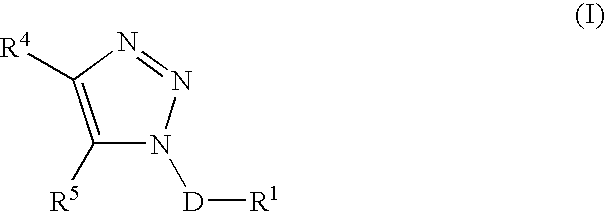Triazole derivatives as tachykinin receptor antagonists
a technology of tachykinin receptor and triazole, which is applied in the field of peptides, can solve the problems of ineffective treatment of chemotherapy-induced nausea and emesis, ineffective management of delayed emesis, and numerous side effects of ssris,
- Summary
- Abstract
- Description
- Claims
- Application Information
AI Technical Summary
Benefits of technology
Problems solved by technology
Method used
Image
Examples
preparation 20
(2-Bromo-pyridin-3-yl)-(2-chlorophenyl)-methanol
[0213]Add LDA (400 mL, 0.8 mol) to 2-bromopyridine (105 g, 0.667 mol) in THF (3.2 L) at −78° C. and stir. After 2 hours, add 2-chlorobenzaldehyde (103 g, 0.733 mol) in THF (300 mL) and allow the reaction mixture to gradually warm to ambient temperature. Treat the reaction mixture with 1 M HCl (1.7 L) and extract with diethyl ether. Combine the organic layers and wash with water and brine. Dry over sodium sulfate, filter, and concentrate under reduced pressure. Purification by flash chromatography, eluting with hexane:ethyl acetate (10:1 to 1:1) gives the title compound: 1H NMR (300 MHz, CDCl3), δ8.28(dd, 1H, J=1.83, 4.73), 7.67 (dd, 1H, J=1.83, 7.63), 7.48-7.19 (m, 5H), 6.41 (s, 1H), 3.10 (bs, 1H); MS (IS) m / z 298.0 (M+1), 300.0 (M+1); Analysis for C12H9BrClNO: calcd: C, 48.27; H, 3.04; N, 4.69; found: C, 49.06; H, 3.18; N, 4.64. Rf=0.29 heptane: ethyl acetate, 2:1).
[0214]By a method analogous to Preparation 20, using the appropriate s...
preparation 29
(3-bromo-pyridin-4-yl)-(2-chloro-phenyl)-methanol
[0216]Add n-BuLi (48.2 mL, 77.1 mmol, 1.6N in hexane) to a −70° C. solution of diisopropylamine (10.8 mL, 77.1 mmol) in THF (130 mL) in a flame-dried flask. After 30 minutes add 3-bromo-pyridine (2.48 mL, 25.7 mmol) dropwise and stir the mixture at −70° C. After 4 hours, add 2-chloro-benzaldehyde (2.95 mL, 26.2 mmol) dropwise, stir at −70° C. After 1 hour, warm reaction to RT, quench reaction with dropwise addition of 60 mL saturated NH4Cl solution. Extract with Et2O (3×), wash with brine, dry the combined organic layers over MgSO4 and concentrate. Purify the residue by flash chromatography on silica gel eluting with 0-40% EtOAc / hexane to afford the title compound: MS(IS) 299 (M+1); TLC (50% EtOAc / hexanes) Rf=0.23.
preparation 30
(5-Bromo-pyrimidin-4-yl)-(2-chloro-phenyl)-methanol
[0217]Slowly add freshly prepared lithium diisopropylamide (0.5 M in ether) to a refluxing solution of 5-bromopyrimidine (4.03 g, 25.3 mmol) and 2-chloro-benzaldehyde (3.55 g, 25.2 mmol) in ether (100 mL). After addition is complete, stir at reflux for an additional 2 hours, then quench with 2N HCl (50 mL). Wash the organic layer with water (4×50 mL), dry, filter, and concentrate. Purify the crude material by flash chromatography using a linear gradient of 100% hexanes to 50% EtOAc / hexanes to give the title compound: MS (IS) 298.9 (M+1); 1H NMR (400 MHz, CDCl3) δ 9.19 (s, 1H), 8.77 (s, 1H), 7.40 (dd, 1H, J=1.4, 8.4), 7.23 (dt, 1H, J=1.9, 7.9), 7.15 (dt, 1H, J=1.4, 7.7), 6.92 (dd, 1H, J=1.5,7.9), 6.34 (d, 1H, J=6.4), 4.75 (d, 1H, J=6.7).
PUM
 Login to View More
Login to View More Abstract
Description
Claims
Application Information
 Login to View More
Login to View More - R&D
- Intellectual Property
- Life Sciences
- Materials
- Tech Scout
- Unparalleled Data Quality
- Higher Quality Content
- 60% Fewer Hallucinations
Browse by: Latest US Patents, China's latest patents, Technical Efficacy Thesaurus, Application Domain, Technology Topic, Popular Technical Reports.
© 2025 PatSnap. All rights reserved.Legal|Privacy policy|Modern Slavery Act Transparency Statement|Sitemap|About US| Contact US: help@patsnap.com



